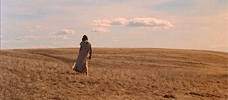Reviews
Terrence Malick
USA, 1978
Credits
Review by Michael Nordine
Posted on 24 May 2011
Source 35mm print
Related articles
Reviews
Days of Heaven by Rumsey
Categories Another World: Terrence Malick at LACMA
Days of Heaven reveals as much about its author’s process as it does about his thematic tendencies. This is most evident in the disparity between its screenplay and its final form. Most conspicuously absent in the former are the voiceovers from the point of view of young Linda, which are central to the film, due largely to the fact that her naturalistic ruminations were improvised. Malick himself is something of an improviser, and has been known to halt large-scale shots in order to film a rare bird that happens to be flying by and have his actors attempt scenes both with and without dialogue. This constant search for a transcendent moment is ever-present in Days of Heaven just as it is in all of Malick’s films, and so it’s unsurprising that he tends to use his screenplays as starting points rather than unshakable foundations.
The visual elements of Days of Heaven’s script are nevertheless written with such elegance that it’s somehow regrettable the words don’t accompany their corresponding images onscreen. An example: Bison drift over the hills like boats on the ocean. The screenplay is flooded with such images, the effect of which is often to add an unsettling air to otherwise-serene moments. Tiny sounds are magnified in the early morning stillness: grasshoppers snapping through the air, a cough, a distant hawk, we read as though in a novel, and after a while it becomes apparent that details such as these are as important as any other in the film. In eliding them, Malick implies their significance rather than stating it explicitly.
There are also near-constant references to animals in the script. Livestock sense an imminent locust swarm before the farmers do, peacocks wander the fields, and a horse refuses to be ridden by the man who has killed its master. Onscreen, the animals recede into the background and work as a parallel to their human counterparts.
Animals - snakes and gophers, rabbits and foxes - dart through the field into the deep of the wheat, not realizing their sanctuary is growing ever smaller as the reapers make their rounds. The moment will come when they will every one be killed with rakes and flails.
The snakes in this passage allude to the film’s Biblical title. The implication is made explicit in the script when a preacher recites the passage from which the name is taken: “[…] that your days may be multiplied, and the days of your children, in the land which the Lord swore unto your fathers to give them, as the days of heaven upon the earth.” The title’s most woeful implication is that, in order for there to be days of heaven, there must also be days of hell.
Appropriately, Days of Heaven is bookended by fire: first the flames of a factory in Chicago and then a climactic blaze (which, in an even more explicitly Biblical occurrence, is preceded by a swarm of locusts)—the bucolic days of heaven amount to little more than a brief interlude. The second and final conflagration is a trancelike, almost hallucinatory sequence, starting in smoke and ending in the ruination of much of the golden wheat that’s come to define Days of Heaven’s distinct look. Through the din of noise and mass of faceless onlookers, one thing is clear: heaven this is not. Linda speaks early on of “the whole world going up in flames” and claims that “If you’ve been bad, God don’t hear you. He don’t even hear you.” Tellingly, the argument between her older brother Bill and his foreman which leads to the latter’s death - which takes place among fire and coal and spurs Bill’s escape from the city - is unintelligible to the viewer. Bill is being “bad,” and so we can’t hear him.
What passes for heaven in the film is itself quite sordid. Days of Heaven’s happiest segment, during which time Bill, Linda, and Abby are living with the farmer, is based on the lie that all three of them are siblings. Abby has been talked into marrying the farmer by Bill (who’s actually her boyfriend) so that she might inherit his fortune when he succumbs to an unnamed terminal illness. Only Linda, who somehow floats above these circumstances, seems truly happy here. There are few moments of unqualified joy in Malick’s films; even the best of times tend to be bittersweet.
Bill is one of Malick’s most pitiable characters. He knows he’s unexceptional, knows he’ll never achieve much, and decides to take what he can get. (He is in some ways a more saturnine version of Kit from Badlands.) “No matter what you do,” he says at one point, “sometimes things just don’t go right. It gets to you after a while. It gives you that feeling of, ‘Oh hell, what’s the use?’” Bill exemplifies a commonality among Malick’s characters of worsening already-dire circumstances through bitterness and jealousy. What he talks Linda into doing is many things—desperate, sad, shortsighted, but also entirely understandable once we’ve gotten to know him to the extent possible. Malick makes us sympathize with his characters even as we struggle to fully understand them.
Even so, Days of Heaven is neither character- nor plot-driven; there’s little dialogue and even less action. What moves it along as it meanders from thought to image, image to sound is the impressionistic beauty of both Nestor Almendros’ cinematography and Ennio Morriconne’s score1. The whimsy of the music in particular is often noted at the expense of its portentousness—Morriconne’s main theme succinctly conveys the implicit meaning of Days of Heaven’s title. Focused around nature - extended shots of wheat blowing in the wind, grasshoppers clinging to plants, and the perfect blue sky abound - as well as the Edward Hopper-inspired house in which the farmer lives, the film’s arresting scenery is less a backdrop and more a principal character. Much of the film was shot in magic hour - the brief period between sunset and nightfall during which the sky is awash in painterly oranges, pinks, and reds - and this perhaps contributes more to its vivid aesthetic than any other single factor. The interplay (and even tension) between these many images and Morriconne’s melancholic score highlights the fact that Malick doesn’t intend to merely celebrate nature’s beauty; he’s more interested in underscoring man’s tenuous relationship with it. “Nature’s cruel,” he reminds us in his next film. So, too, is man, but with one difference: the former can exist without the latter. “We’ll all be gone in a couple of years,” Bill laments. “Who’s gonna care that we acted perfect?” Our time on this earth is fleeting, and so, too, is Malick’s treatment of his human subjects. We are offered snippets of dialogue rather than full conversations, glimpses of characters’ faces instead of extended looks.
Days of Heaven is a series of journeys, both internal and external. Bill uproots his girlfriend and kid sister after accidentally killing his foreman, moving them from Chicago to the Texas panhandle (a journey best remembered by the iconic image of a train chugging across a bridge, its black smoke billowing into the otherwise blue sky); animals constantly meander about the farm; Bill, Linda, and Abby attempt to escape downriver after the climactic fire. The film’s last scene shows Linda walking along train tracks with a friend, serving as both a return to the image of the train and a reminder that such movement will continue, even though we’ve seen all we’re going to of Linda’s internal journey. As with most else in the film, this is a mere glimpse of a larger whole.
Malick’s fixation on innocence finds its embodiment in Linda, who acts as observer more than participant. The story she tells is not so much her own as that of those around her, and yet it is she who is most shaped by it. Her narration, as abstract and philosophical as it is puerile, guides the movie along like a slow-moving train. She mentions major events only in passing so that she can focus her energy on describing sounds she hears and thoughts that come to mind. This refusal to privilege the “big” over the “small” is present in all of Malick’s work, and has its first fully-realized expression here. There’s an indelible mix of wonder and cynicism to her words (much of which is no doubt due to her endearing slur), that proves to be one of Days of Heaven’s most distinct setpieces. Linda’s detachment from the goings on of Days of Heaven is directly responsible for her oddly keen observations, forcing the question of whether it’s the events themselves that are strange, or just her perception of them. Her presence is at once externally insignificant while internally paramount to the film.
Through Linda, Malick taps into the sort of ineffable emotions which we understand immediately even if we can’t always put them into words. That these feelings are often meant to be experienced rather than described would make the mere act of writing about them an exercise in futility were it not for the fact that Malick, with his constant use of voiceover, values words as much as he does images. In an interview for the Criterion release, Sam Shepard (who plays the farmer) speaks to this:
It’s great fun to intellectualize Terry’s films, and you can do that, but for me, they’re not intellectual so much as they’re visceral. I don’t know how to explain it… they’re like poems. You can analyze it to death, but it still is not going to get to what this poem is doing to you, to your psyche, your body. It’s never going to solve that.
Days of Heaven is a reminder of film’s singular capabilities as a sensory experience. Consider how much information is conveyed visually in the title sequence alone: Woodrow Wilson tips his hat to onlookers; children play stickball in an alley; a man works in a factory. All but one of the sepia-toned faces we see is of a commoner, and already the film’s thematic bedrock has been wordlessly articulated. Not coincidentally, Malick’s writing/directing credit is accompanied by an image of a large group of children happily playing together—again, innocence. Though quite beautiful (which is to say, heavenly), the images we are seeing soon give way to something darker and more sinister. As one of Malick’s chief concerns, innocence, like nature, is beautiful as a result of its fragility, wont as it is to be destroyed by the actions of man.
- Almendros was losing his sight during the filming of Days of Heaven and eventually had to be replaced by Haskwell Wexler after shooting ran behind schedule. Despite photographing a significant portion of the film (including all the interiors), Wexler received only an “additional photography” credit and did not share Almendros’s Academy Award. ↩
More Another World: Terrence Malick at LACMA
We don’t do comments anymore, but you may contact us here or find us on Twitter or Facebook.








